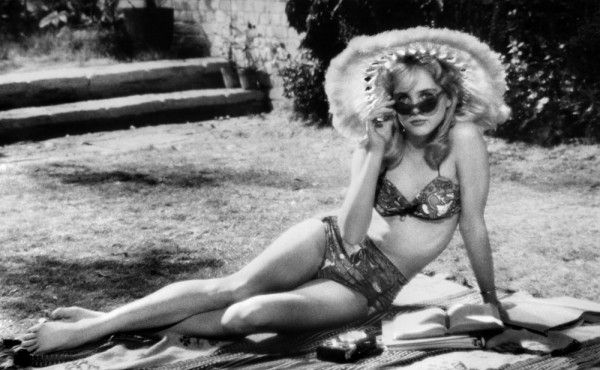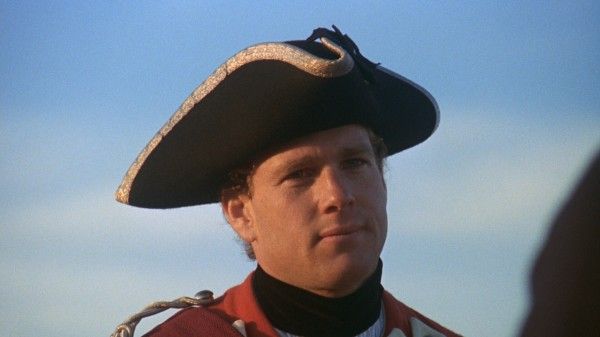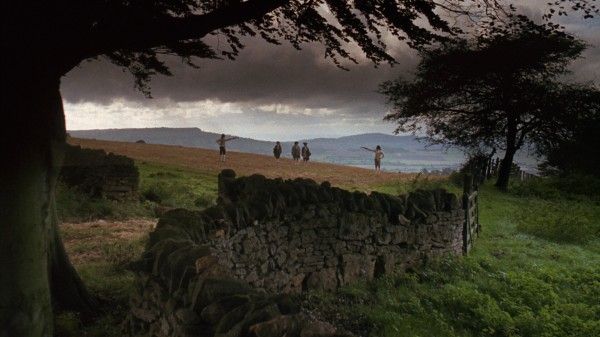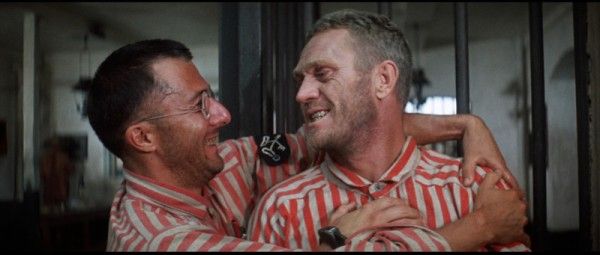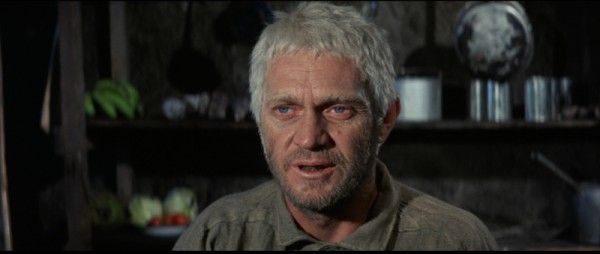Two Kubrick films left out of the original Kubrick Box set and Papillon. What do these films have in common? All three have recently been put out by Warner Brothers. For Lolita and Barry Lyndon, it’s a bare bones affair, but for Papillon, it’s got a nice book casing, and a period featurette. Actually with Papillon the best supplement is the packaging itself. Still, these are catalog films that it’s good to see on the format, and our reviews of Lolita, Barry Lyndon and Papillon on Blu-ray follow after the jump.
Stanley Kubrick’s Lolita is a perfect film for about an hour. And for about ninety minutes it’s a really great film. But by the time the film comes to its conclusion, it’s hard to have the passion that the first hour creates.
The film opens with Humbert Humbert (James Mason) coming to the house of Clare Quilty (Peter Sellers). Humbert insists Quilty read a letter - which he does in silly voices - and then Humbert murders Quilty. Then the film cuts to four years earlier. It’s an amazing set piece, and takes the air out of the film as it shifts to explain how Humbert became a murderer. A British writer and teacher of French literature, he comes to small town America to teach at a college, and finds boarding with Charlotte Haze (Shelley Winters), who has a young daughter Delores, known as Lolita (Sue Lyon). Charlotte wants Humbert, and that’s enough for Lolita to flirt with Humbert, hoping to steal him away. Humbert marries Charlotte, but mostly to get closer to her daughter. This is staged as a French farce, so it somehow manages to be hilarious in spite of or perhaps because of how terrible this love triangle is. Then a tragedy happens, and the film shifts gears as Humbert steals away with Lolita, hoping to have a life to themselves.
But on his tail seems to be Clare Quilty, who keeps showing up and often in different disguises. Sellers is asked to wear many hats, but he’s an absolute charmer in the role, and though the disguise angle may have been played up by his quote unquote wackiness, you get the sense that he and Kubrick were actually working together. Sellers’s introduction on the dance floor is a marvel, and he does good work as the doppelganger of Humbert. That said, this is one of James Mason’s best roles, and he is great both as comedian and hurt lover. And then there’s Shelley Winters. She may seem brash and over the top, but her impression is indelible, and she wears her flaws and insecurities on her sleeves - and it’s great to see a movie where a woman is actively jealous of her daughter for being so attractive. Alas, the third act was never cracked for cinema by Kubrick or Vladimir Nabakov (credited as the screenwriter, though Kubrick rewrote it so much that Nabakov’s version was later released as a screenplay. The differences are intense). The book is one of the finest of the 20th century, but the film can’t figure out how to show the journey that leads to total alienation and Lolita running away without dragging the film to a slowed paced for at least a half hour of screen time, as the two endlessly bicker. It just keeps going. It’s the problem with films about spiraling down. How much should you show? It’s a hard balance, and everything works fine, but there’s no more energy in the film as it comes to its sad and desperate end. Still, it’s one of Kubrick’s most odd and underrated films, and it’s great that it’s finally on Blu-ray. The film comes in widescreen (1.66:1) and in DTS-HD 1.0 Mono. Picture quality is excellent, and improves on the previous DVD versions. But – like those – the only extra is a trailer.
Barry Lyndon is the Kubrick film that seems to divide his fans. Because it’s the one that is most ignored of his later period, it’s easy to see why a number of Kubrick fans have latched on to it as his best work. Where films like The Shinning and 2001 have been championed to the point that watching them can seem like going to school, Barry Lyndon is one of the Kubrick films you can discover.
Ryan O’Neal stars as Redmond Barry, a poor young Irishman who is in love with his cousin, but is modest in his pursuits. He gets into a duel with one of her suitors, and it’s arranged for him to win and run away. Eventually he joins the army, to which he steals a uniform and is captured by the Prussians. He is used to get close to Chevalier de Balibari (Patrick Magee), which leads to his escape and attempt to join the privileged class. From there the film becomes about how fortune removes itself from his life.
Kubrick’s gaze in this film is unparalleled, but Kubrick was always a great shooter, and here he wanted to test how low light levels he could use and still have good picture quality. Kubrick lit mostly with candles, and the effect is breathtaking. As the film was never released anamorphically on DVD, the jump in picture quality is noticeable from the previous home video releases, and the film is presented in 5.1 DTS-HD surround. The quality difference alone makes it well worth getting the upgrade. But the film itself makes it a worth purchase. This is Kubrick at his best, as his supposed detachment allows the film to play as if through a portal. Why Redmond Barry is worth following in his rags to riches to rags tale is interesting is partly because of the large scale that Kubrick was working on, but also it’s just a rich dense text. Though period films are often boring as the film glides along the surface of its period details, here Kubrick is fully invested in the reality of the setting, so it’s never distracting in its context - the film creates a great sense of immersion. And while the narrative is familiar, it’s done in a way that is unfamiliar and inviting.
Many have accused O’Neal of being weak, and there is a sense that Kubrick would often chose modest actors (Keir Dullea, Mathew Modine, Tom Cruise) for his leading men. But though O’Neal at the time was a box office draw, Kubrick uses his weaknesses to the film’s strengths. We are supposed to keep Barry at a little distance. The film has a curious sense of amusement at the proceedings, and though Kubrick can be seen as laughing along with Alex at the end of A Clockwork Orange as he may also tut-tut, here the bemusement is more otherworldly. It’s more a God’s bemusement at the foibles of man.
I fall into this movie over and over again. The elegance, and the sense that this hasn’t been poured over like some of his other films makes it feel fresh and more revealing than – say – 2001. Sadly, the only supplement is the film’s theatrical trailer, which hasn’t even been mastered for HD.
I hadn’t seen Papillon before. Franklin J. Scaffner directed Patton and Planet of the Apes – a solid filmmaker if there was one, and I love Steve McQueen, but the film held little interest. Watching it for the first hour I was starting to kick myself. McQueen stars as Henri “Papillon” Charriere, who is wrongly convicted of murder and finds himself sent to Devil’s Island. He’s imprisoned with Louis Dega (Dustin Hoffman), a stock swindler that Papillon figures is a good fish to protect. The film then covers Papillon’s attempts at escape, with a long stretch in solitary that nearly breaks him physically and mentally.
For a while, the film has the classic structure of a prison movie, with escape the main goal, and the cast of characters surrounding them. But the narrative proves too episodic, and when you move into the final section - with all of its digressions - it just grows stale. McQueen is in fine shape, but he’s done this better before in the classic The Great Escape, and this does nothing but coast on those charms, while Dustin Hoffman manages to make himself into a caricature, nothing but ticks and big glasses.
There should be big ideas, or an adventure yarn behind this, but all it feels like is Oscar bait. From a screenplay by Dalton Trumbo and Lorenzo Semple Jr., to the director and stars, I get the feeling this was supposed to be a big deal. But there’s not enough under the surface, and by the time the film comes to a conclusion, what the point of the whole thing is seems lost. There’s no great core friendship, and the nobility of man’s spirit (or whatever theme you want to associate with trying to get out of prison) seems more an afterthought. The film is the work of an older director, with some good ideas, but a lot of slack on the line. Still, it’s fun to watch McQueen, even in a lesser role.
Warner Brother’s release presents the film in widescreen (2.35:1) and in DTS-HD 5.1 surround. The transfer is excellent, and the film looks like a 70’s film without showing any great wear. Extras are limited to a period making of called “The Magnificent Rebel” (12 min.) and the film’s theatrical trailer.


